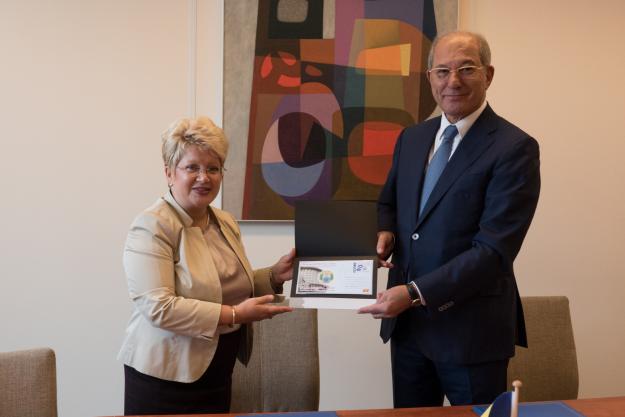
OPCW Director-General Ahmet Üzümcü (right) and H.E. Ms Brândușa Predescu, Permanent Representative of Romania to the OPCW, signed yesterday a Privileges and Immunity Agreement between the OPCW and Romania.
THE HAGUE, Netherlands — 7 September 2017 — The Director-General of the Organisation for the Prohibition of Chemical Weapons (OPCW), Ambassador Ahmet Üzümcü and H.E. Ms Brândușa Predescu, Permanent Representative of Romania to the OPCW, signed yesterday a Privileges and Immunity Agreement between the OPCW and Romania.
The Chemical Weapons Convention (CWC) calls for the specific privileges and immunities to be granted to the OPCW, its officials and delegates to be defined in agreements between the OPCW and the States Parties concerned.
During the signing ceremony, which took place at OPCW Headquarters in The Hague, the Director-General stated, “I welcome Romania’s commitment to the work of the OPCW and the signing of this agreement will enhance the Organisation’s ability to conduct capacity-building activities in the territory of Romania.”
Ambassador Predescu echoed the Director-General’s sentiments and further shared that the signing of the agreement was another “reconfirmation” of Romania’s commitment to the international arms control regimes.
The Privileges and Immunity Agreement signed yesterday will go into effect once Romania has completed the necessary domestic legal requirements and then notifies the OPCW.
Background
The basic text of Privileges and Immunity agreements between the OPCW and its States Parties accords functional privileges and immunities to the OPCW and, in varying degrees, to the Director-General, staff, experts, and the representatives of States Parties participating in OPCW meetings. These functional privileges and immunities are consistent with those granted to other international organisations, staff and delegates.
As the implementing body for the Chemical Weapons Convention, the OPCW oversees the global endeavour to permanently eliminate chemical weapons. Since the Convention’s entry into force in 1997 – with its 192 States Parties – it is the most successful disarmament treaty eliminating an entire class of weapons of mass destruction.
Ninety-six per cent of all chemical weapon stockpiles declared by possessor States have been destroyed under OPCW verification. For its extensive efforts in eliminating chemical weapons, the OPCW received the 2013 Nobel Prize for Peace.
More Information
